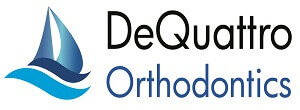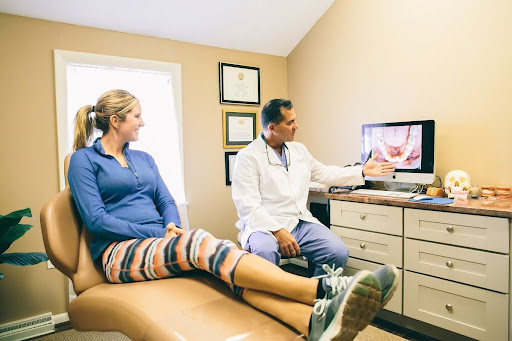Advanced Orthodontic Treatment for Improved Oral Health in Rhode Island
Has your child’s dentist mentioned crowded teeth or a crossbite? Without proper orthodontic treatment, these dental issues can make everyday activities like speaking and eating increasingly difficult. At DeQuattro Orthodontics, Dr. Frank DeQuattro and our experienced team provide specialized dentofacial orthopedics to help children and adults throughout Rhode Island achieve optimal oral health.
We’re proud to offer palatal expansion therapy as a less invasive treatment option to prevent crowding and misalignment. To discover how this innovative orthodontic treatment can benefit your family, call our Wakefield, RI, orthodontic office at (401) 783-9890 or our Westerly, RI, office at (401) 596-2264 to schedule your consultation.
What Is Palatal Expansion?
Palatal expansion is an orthodontic procedure that gradually widens the upper arch of the mouth using a palatal expander attached to the roof of the mouth. This device applies gentle pressure, stretching the mid-palatal suture and encouraging the two halves of the palate to move apart, allowing new bone to form.
While minor tooth movement may occur, the main goal is to broaden the upper jaw, often recommended for patients with orthodontic problems such as a narrow arch, crowded teeth, or crossbite. The expander usually remains in place for several months, with longer treatment possible for more complex cases.
Benefits of Palatal Expansion Treatment in Rhode Island
Palatal expansion therapy offers numerous advantages for patients in Wakefield, Westerly, and surrounding Rhode Island communities:
- Improved Breathing: Creates more space in the nasal cavity, reducing sleep apnea symptoms and enhancing overall respiratory function.
- Corrected Crossbite: Helps properly align upper teeth with lower teeth for a functional bite.
- Reduced TMJ Risk: Minimizes the risk of developing temporomandibular joint disorders.
- Enhanced Aesthetics: Contributes to a more balanced facial profile and confident smile.
- Better Oral Function: Creates sufficient space for proper teeth alignment and bite function.
- Prevention of More Invasive Procedures: May eliminate the need for tooth extraction or surgical intervention later in life.
- Long-term Oral Health: Reduces the risk of tooth decay and gum disease by eliminating crowding that can trap food and bacteria.
Who Qualifies for Palatal Expansion?
Expansion therapy is most effective for children whose jawbones are still developing, typically between ages seven and 10. This growing period represents the ideal time to begin treatment, as the mid-palatal suture remains flexible and responsive to expansion.
This orthodontic treatment can effectively address:
- Misaligned bites (overbite, underbite, open bite, or crossbite)
- Difficulties with chewing, speaking, sleeping, or breathing
- Impacted teeth or teeth that can’t erupt properly
- Crowded teeth requiring additional space in the dental arch
For adults and older adolescents whose jaw development is complete, we may recommend alternative approaches such as temporary anchorage devices (TADs) or surgical assistance combined with expansion therapy. Dr. DeQuattro will determine the most appropriate treatment plan during your consultation.
Call our Wakefield, RI, office at (401) 783-9890 or our Westerly, RI, office at (401) 596-2264 to schedule your consultation.
Diagnosis and Treatment Planning at DeQuattro Orthodontics
If you suspect your child might benefit from palatal expansion, we encourage you to visit one of our conveniently located orthodontic practices in Wakefield or Westerly for a thorough evaluation.
In-Depth Examination
During your initial consultation, our experienced orthodontist will conduct a comprehensive examination to assess your child’s oral health. This examination includes state-of-the-art diagnostic tools such as digital X-rays, intraoral photographs, and precise impressions of the teeth. These diagnostic resources provide essential insights into tooth alignment, jaw structure, and oral health.
Personalized Treatment Planning
Based on our diagnostic findings, Dr. DeQuattro will develop a customized treatment plan tailored to your child’s needs and goals. If palatal expansion is recommended to address issues such as crowding, crossbite, or airway obstruction, we’ll incorporate it into your comprehensive treatment plan.
In some cases, expansion therapy may be combined with other orthodontic appliances, such as traditional braces or Invisalign®, to achieve optimal results. We prioritize clear communication throughout the process, ensuring parents and patients understand all treatment options and feel confident with the recommended approach.
The Palatal Expansion Process: What to Expect
Placement of Your Palate Expander
The expanders used in palatal expansion treatment are typically secured to the upper jaw by attaching them to the back molars. These specialized devices feature a screw mechanism positioned in the center of the expander, which can be activated using a special key provided by our office.
Activation and Expansion
As our orthodontist turns the expansion screw, the palate expander widens slowly. It applies steady pressure to the bones in the roof of your mouth and stretches the mid-palatal suture. Dr. DeQuattro will carefully monitor this process during regular appointments to ensure safe and effective expansion of the upper arch.
Sensations and Adjustments
During expansion, your child may experience various sensations as their upper jaw widens. They might feel pressure against their teeth and behind their nose. Some patients report temporary discomfort or headaches, which typically respond well to over-the-counter pain medication.
Adaptation Period
It’s normal for patients to experience increased saliva production and make occasional slurping sounds initially. This adjustment period typically lasts several days to a week as they become accustomed to wearing the expander.
Progress and Signs of Success
After a few days or weeks of turning the expander as prescribed, you should begin to notice a space developing between your child’s front teeth. This gap indicates the expansion is progressing as planned and is a positive sign of successful treatment.
Transition to Braces or Aligners
Once we achieve the desired expansion, the expander will be removed, and the space between the front teeth may partially close naturally. Complete alignment is typically achieved with traditional braces or Invisalign. These secondary treatments further align the upper teeth and ensure proper occlusion with the lower teeth.
Post-Expansion Care for Long-Term Results
Following the palatal expansion process, your child will need to wear a retainer to maintain the new position of the upper jaw and prevent relapse. Consistent etainer wear as directed by your Wakefield or Westerly orthodontist is essential for long-term stability and optimal treatment outcomes.
Caring for Your Child’s Palate Expander
Ensuring proper care for your child’s expander is crucial for successful treatment. Dr. DeQuattro recommends following these instructions carefully:
- Perform the prescribed turns according to the recommended schedule
- Brush the expander daily as part of regular oral hygiene
- Use a water flosser or small interdental brush to remove food particles trapped above the expander
- For removable expanders, thoroughly clean and rinse the device each time it’s removed
Frequently Asked Questions
What are the risks or side effects of palatal expanders?
While palatal expansion is generally safe and effective, some temporary side effects may include initial discomfort, minor speech adjustments, and temporary changes to the bite. These effects typically resolve quickly as patients adapt to the expander.
What foods should my child avoid while wearing an expander?
Similar to braces, certain foods can potentially damage expanders. Avoid:
- Sticky and chewy foods (caramel, taffy, gummy candies)
- Hard and crunchy foods (popcorn, nuts, hard candies)
- Chewy breads and dense meats
Instead, opt for softer alternatives like yogurt, pasta, smoothies, and soft-baked goods. Your child can still enjoy treats like ice cream and soft cookies (without nuts or caramel) while protecting their orthodontic appliance.
What should we do if the expander breaks?
If your child’s palate expander breaks or becomes damaged, contact your orthodontist’s office immediately to schedule an appointment. In the meantime, carefully remove loose pieces from the mouth to prevent discomfort or injury. Never attempt to repair the expander yourself, as this could compromise treatment results.
Can adults undergo palatal expansion?
Yes, adults can benefit from palatal expansion, though the approach differs from pediatric treatment. Since adult jawbones are fully developed, expansion in adults may require additional support through temporary anchorage devices (TADs) or surgical assistance.
Schedule Your Consultation at DeQuattro Orthodontics Today
Palatal expansion can help prevent your child from developing poor oral health while creating a confident smile. If you believe your child could benefit from this treatment, contact our Wakefield office at (401) 783-9890 or our Westerly office at (401) 596-2264 to schedule an appointment today.
You can also fill out our online contact form, and our friendly staff will contact you promptly. We proudly serve patients from Narragansett, South Kingstown, Charlestown, Weekapaug, and Rhode Island.



